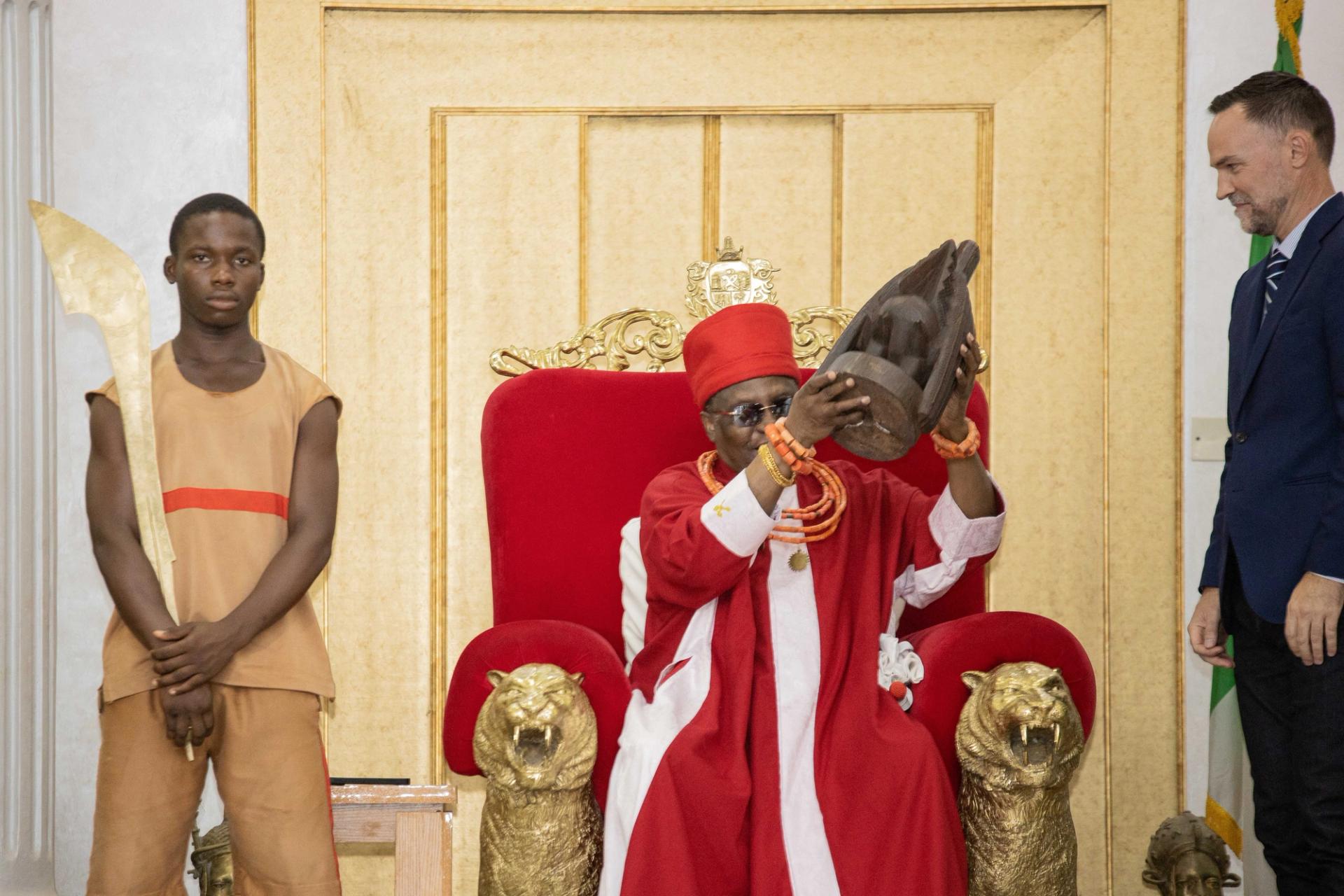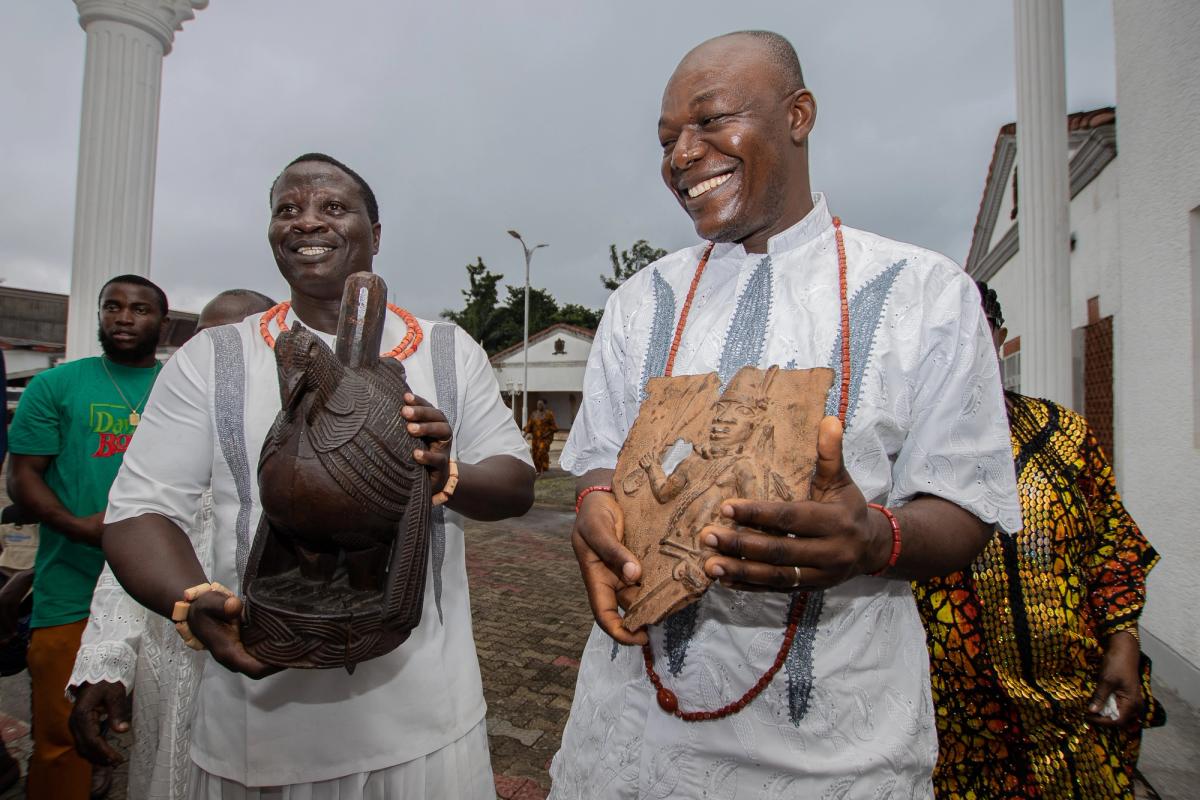The University of Iowa Stanley Museum of Art has returned two Benin bronzes to the Oba of Benin, the first time a US museum has handed back works to the head of the former royal family of the Benin empire. In a ceremony held earlier this week (15 July) at the Benin Palace in Nigeria, the museum restituted two objects, a brass plaque and wooden altarpiece, to Oba Ewuare II.
The so-called Benin bronzes have become a touchstone to test European museums’ readiness to restitute heritage looted from Africa during the colonial era. After the violent 1897 plunder and devastation of the Royal Palace of Benin by British troops, at least 3,000 artefacts were dispersed internationally. The Kingdom of Benin was thereafter incorporated into the British protectorate of Nigeria, which became the independent Federal Republic of Nigeria in 1960.
Early last year the Benin bronzes restitution saga took a new turn after the Nigerian government officially recognised the Oba of Benin, Oba Ewuare II, as the owner and custodian of the looted artefacts.
In May last year, lawmakers in Germany’s ruling parties defended their 2022 decision to unconditionally restitute 22 Benin bronzes to Nigeria. However, the acknowledgement of the Oba of Benin as the owner of the returning artefacts raised consternation in Germany, with concerns that world heritage could disappear into the private royal collection and disappear from public view.
Asked if the Stanley Museum of Art is confident that the works returned will be publicly accessible, Lauren Lessing, the director of the Stanley Museum of Art, says: “It is not my job to tell people what to do with their own possessions. The two works of art restituted were stolen from the Oba of Benin in 1897, and they belong to him.
“The best way for museums to ensure that the public can see these works in the future is to approach the Oba, as they would any other potential lender, and ask. The Oba has said that he intends to lend these important works to museums around the world and I have no reason to doubt him. Ultimately, however, he has the right to say yes to loan requests and he also has the right to say no.”

Oba Ewuare II holds up the brass plaque presented to him by Cory Gundlach (right) during the restitution ceremony at the royal palace
Photo: Omoregie Osakpolor. Courtesy Stanley Museum of Art
In 2019, the Association of Art Museum Directors (AAMD) began creating guidelines for overseeing looted African art in US museum collections. “The Stanley Museum of Art charted a different course, led by Dr. Cory Gundlach's [the museum’s curator of African art] belief that the Benin bronzes belonged directly to the royal family. While other museums pursued repatriation to the Nigerian government, the Stanley persevered in seeking restitution to the Oba,” a museum statement says.
Lessing says that in 2019 she suggested that the AAMD include scholars and stakeholders based in Africa on its African art working group, proposing also that “they do their work on issues of repatriation and restitution more transparently. Like 85% of art museums in the US, we are not members of AAMD, so Cory didn’t get the chance to contribute. Denied knowledge of what the working group was doing and discussing, we simply went our own way.”
The Stanley Museum of Art’s restitution efforts were galvanised by the creation of a dedicated provenance research position created in 2020, which was filled by Mason Koelm who traced the disputed objects to the British siege in 1897.
“This discovery sparked further research and collaboration with Peju Layiwola, a leading scholar on African art restitution, and ultimately, with Prince Aghatise Erediauwa of the Benin Royal Court,” adds the museum statement. In 2022, members of the museum’s collections committee and advisory board voted to formally deaccession the two objects from the collection, which then became works on loan to the museum from the Oba of Benin.
“By returning these cultural treasures, the University of Iowa Stanley Museum of Art has demonstrated its commitment to ethical stewardship and set a powerful example for other museums to follow,” says Kevin Kregel, the executive vice president and provost at the University of Iowa, in a statement. The Smithsonian Institution’s Board of Regents voted in 2022 to deaccession a group of 29 Benin bronzes in its collections to Nigeria’s National Commission for Museums and Monuments.
The latest move puts further pressure on international institutions such as the British Museum, which holds around 900 pieces from the Kingdom of Benin, to return works to Nigeria. The British Museum is prohibited from permanently removing items from its collection under a 1963 UK law.
In his first interview since taking up the position, Nicholas Cullinan, director of the British Museum, today discussed the restitution of objects including the Benin bronzes with the BBC. He noted that any changes to the 1963 law would be a matter for parliament, but that he plans to focus on collaboration.
Discussing historian Mary Beard’s recent suggestion that the museum act as a "lending library" to the world, he said they are “on similar lines”. “There’s a real opportunity here to think about how nationally and internationally we work in partnership with places, whether it’s Birmingham or Benin, to share objects, to share knowledge, expertise, ideas, scholarship,” he told Radio 4’s Today programme.


